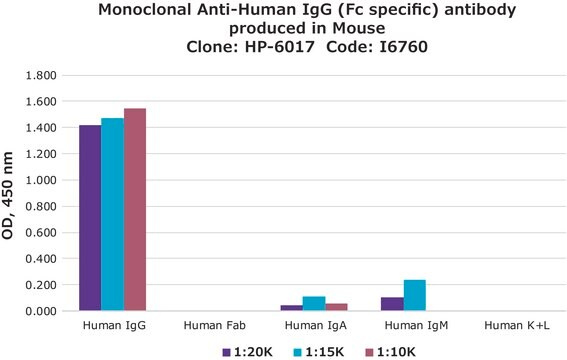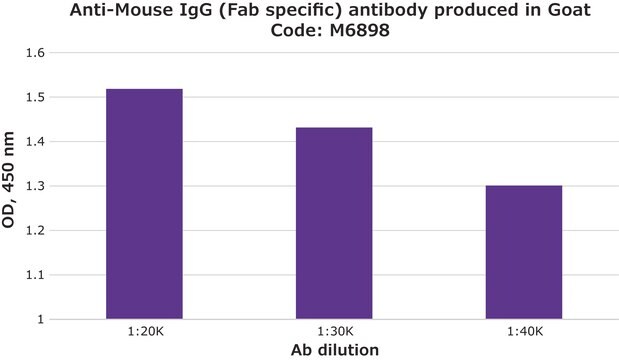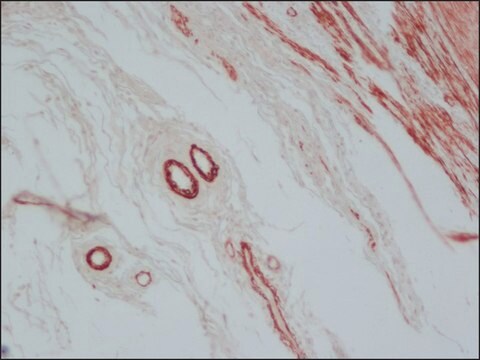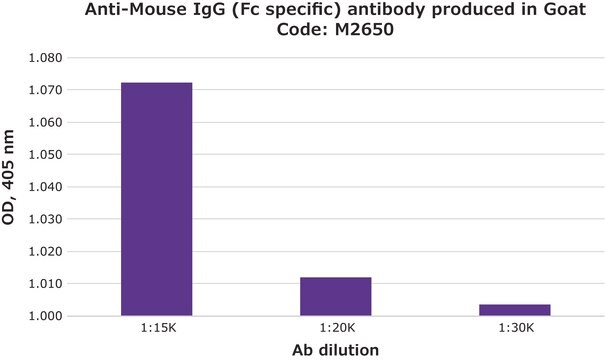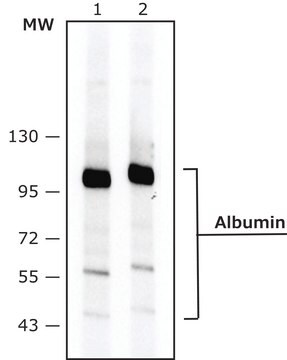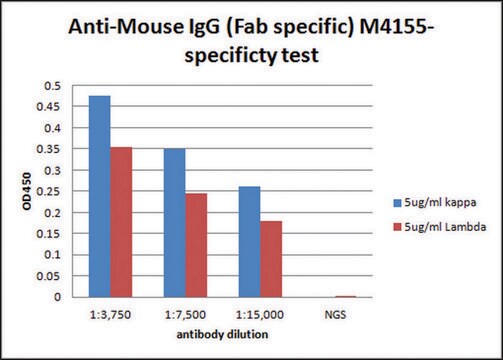AP127
Anticuerpo de cabra anti-IgG de ratón, Fc
2.4 mg/mL, Chemicon®
Iniciar sesiónpara Ver la Fijación de precios por contrato y de la organización
About This Item
UNSPSC Code:
12352203
eCl@ss:
32160702
NACRES:
NA.46
Productos recomendados
biological source
goat
Quality Level
conjugate
unconjugated
antibody form
affinity purified immunoglobulin
clone
polyclonal
species reactivity
mouse
manufacturer/tradename
Chemicon®
concentration
2.4 mg/mL
technique(s)
ELISA: suitable
immunoprecipitation (IP): suitable
western blot: suitable
shipped in
wet ice
target post-translational modification
unmodified
General description
La inmunoglobulina G (IgG) es una de las proteínas más abundantes en suero humano con niveles normales entre 8 y 17 mg/ml en sangre adulta. La IgG es importante para nuestra defensa contra los microorganismos y las moléculas son producidas por los linfocitos B como parte de nuestra respuesta inmunitaria adaptativa. La molécula de IgG tiene dos funciones distintas: unirse al patógeno que desencadenó la respuesta y reclutar otras células y moléculas para destruir el antígeno. La variabilidad del conjunto de IgG se genera por recombinación somática y se estima que el número de especificidades en un individuo en un momento determinado es de 1011 variantes.
Application
Detección de IgG de ratón utilizando este anticuerpo de cabra anti-Fc de la IgG de ratón validado para utilizar en ELISA, IP y WB.
Physical form
Inmunoglobulina purificada por afinidad. Líquido. Amortiguador = fosfato sódico al 0,01%, NaCl 0,25 M, pH 7,6
Storage and Stability
Conservar a +2-8°C en alícuotas no diluidas durante un máximo de seis meses en condiciones estériles.
Legal Information
CHEMICON is a registered trademark of Merck KGaA, Darmstadt, Germany
Storage Class
12 - Non Combustible Liquids
wgk_germany
WGK 2
flash_point_f
Not applicable
flash_point_c
Not applicable
Certificados de análisis (COA)
Busque Certificados de análisis (COA) introduciendo el número de lote del producto. Los números de lote se encuentran en la etiqueta del producto después de las palabras «Lot» o «Batch»
¿Ya tiene este producto?
Encuentre la documentación para los productos que ha comprado recientemente en la Biblioteca de documentos.
Conformation-dependent high-affinity monoclonal antibodies to prion proteins.
Larry H Stanker,Ana V Serban,Elisa Cleveland,Robert Hnasko,Azucena Lemus,Jiri Safar et al.
Journal of immunology (Baltimore, Md. : 1950) (1950)
Different rates of glycolysis affect glycolytic activities and protein properties in turkey breast muscle.
S Eadmusik,C Molette,H Remignon,X Fernandez
Animal : An International Journal of Animal Bioscience null
Larry H Stanker et al.
Toxins, 5(11), 2212-2226 (2013-11-21)
Botulism is a serious foodborne neuroparalytic disease, caused by botulinum neurotoxin (BoNT), produced by the anaerobic bacterium Clostridium botulinum. Seven toxin serotypes (A-H) have been described. The majority of human cases of botulism are caused by serotypes A and B
Miles C Scotcher et al.
PloS one, 5(6), e11047-e11047 (2010-06-16)
Botulinum neurotoxin (BoNT), the causative agent of botulism, a serious neuroparylatic disease, is produced by the anaerobic bacterium Clostridium botulinum and consists of a family of seven serotypes (A-H). We previously reported production of high-affinity monoclonal antibodies to BoNT serotype
Nuestro equipo de científicos tiene experiencia en todas las áreas de investigación: Ciencias de la vida, Ciencia de los materiales, Síntesis química, Cromatografía, Analítica y muchas otras.
Póngase en contacto con el Servicio técnico


